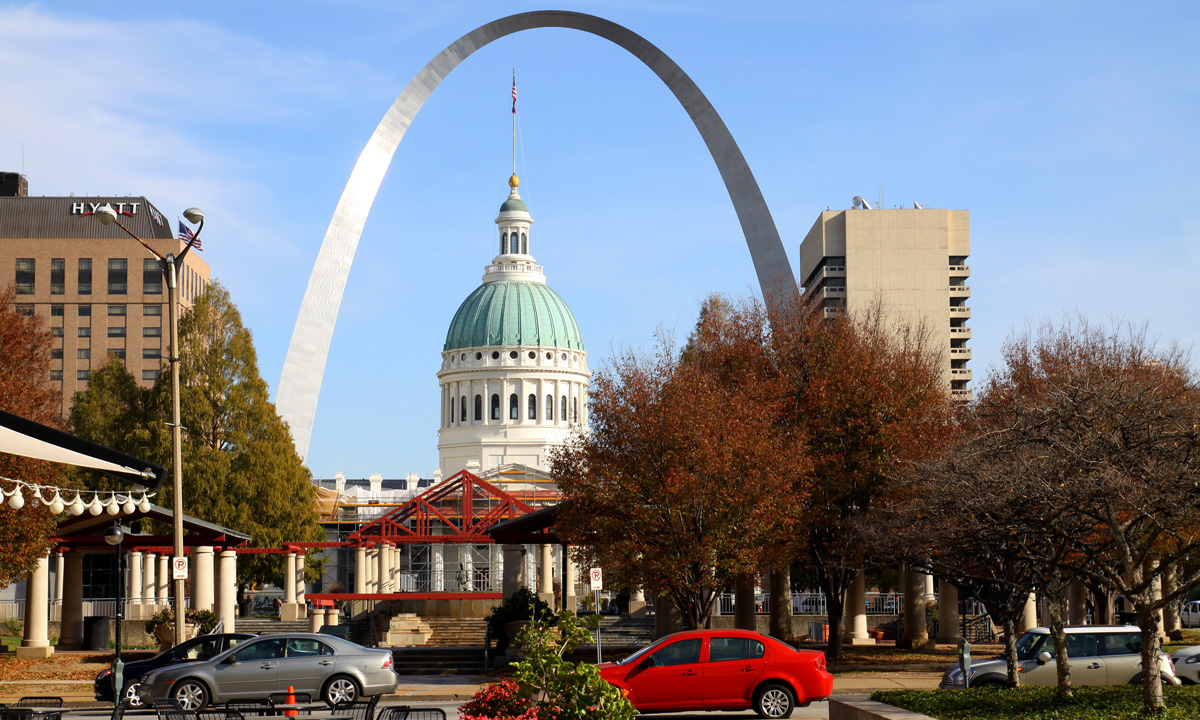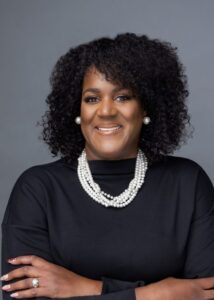Leadership Crisis Fuels Nightmare Start to St. Louis School Year
The school district, already challenged by chronic underperformance and plummeting enrollment, put its superintendent on leave in July.

Get stories like this delivered straight to your inbox. Sign up for The 74 Newsletter
St. Louis’s 2024–25 school year got off to a nightmare start last month.
Superintendent Keisha Scarlett — hired last year to great fanfare as the first Black woman to lead the district — has taken a paid leave of absence that most observers believe she will not return from. Her departure has only contributed to the organizational chaos surrounding the district, which also includes most of Scarlett’s senior staff similarly heading for the door. Worse still, an ongoing transportation meltdown continues to prevent many students from receiving bus services since classes began on August 19.
It has been another devastating setback to a district that was already grappling with huge academic and fiscal challenges. The city’s students, disproportionately poor and non-white, have long posted standardized test scores near the bottom of Missouri’s state rankings. Over decades, chronic disappointment led parents to abandon local schools in droves, reducing total enrollment to less than one-sixth of its former size. And the pandemic exacted a significant toll on kids still in attendance, with one analysis estimating that math performance was set back by more than 1.5 years.
The latest news is “the last thing the district needed,” sighed John Wright Sr., a veteran educator who once served as St. Louis’s interim school superintendent and more recently held a seat on its school board.

The converging crises of leadership and capacity may soon trigger intervention from either voters or Missouri authorities. St. Louis Mayor Tishaura Jones has already called for an investigation into the district’s mismanagement from the state auditor’s office, which has obliged by fast-tracking a previously planned audit. And next spring, the electorate will have the opportunity to vote out the school board’s president and vice president, who have each faced calls to resign.
The situation came to a head in late July, when it was announced that Scarlett would be placed on leave and replaced in the interim with deputy superintendent Millicent Borishade. The surprise development followed the discovery that the district’s newly hired communications director intended to live, at least part-time, in Houston while serving in a position that would pay her up to $185,000 annually.
In the weeks that followed, six senior staffers, including SLPS’s chief financial officer, chief of staff, and deputy chief of operations, were fired. Most had worked with Scarlett at her previous district, Seattle Public Schools, and according to reporting from the St. Louis Post-Dispatch, all were hired to six-figure salaries.
Adolphus Pruitt, president of the St. Louis branch of the NAACP, called it “unfortunate” that the school system lost much of its top talent as the school year began, but added that the public perception of favoritism likely proved too damning for the school board not to act.
“I don’t have a problem with somebody coming in to manage operations saying, ‘I need to bring a new team around me,’ instead of relying on the team that’s already in place,” said Pruitt. “But if they did that without going through the proper procedures, that’s a problem.”
‘We were not consulted’
Alongside state authorities, the St. Louis Board of Education has initiated their own audit of Scarlett’s spending and hiring practices. The outcome of that investigation, which will likely determine the superintendent’s fate, is expected to be released this month.
Matt Davis, the board’s vice president, told The 74 that his concerns were first raised in June, when he reviewed a report from the district’s human resources department indicating that an outgoing staffer had earned compensation in excess of $185,000 — an upper bound for senior employees that had been negotiated between the board and Scarlett.
While the board voted to approve the hires, he said, it had largely left decisions on compensation to the district chief. That deference was viewed as necessary given a widely held perception that previous superintendents had been driven away due to micromanagement.
“We were not consulted on the setting of their salaries, as far as I understand it,” Davis said. “I know that sounds ridiculous, but we were finding out stuff in the newspaper that we weren’t aware of.”
Still, he conceded, he could not rule out the possibility that the board had authorized salaries in excess of its own informal maximum with Scarlett, possibly in the course of another vote. Davis had no recollection of having done so, he said, and the results of the internal audit would offer an answer.
“I don’t want to think that we voted on something — which is unfortunately possible — that was included in a packet of other stuff and I don’t know about it,” he reflected. “If that was the case, that was really dishonest because it was not our expectation of what should happen.”
‘What’s next?’
The NAACP’s Pruitt has not hidden his displeasure with the performance of the school district recently. In mid-August, his organization filed a complaint against St. Louis Public Schools — alongside 33 other districts in the St. Louis area — with the U.S. Department of Education’s Office of Civil Rights, pointing to markedly lower rates of reading proficiency for Black children relative to their white peers.
Those dismal achievement levels, along with the sudden staffing purge, come in stark contrast to the high expectations that attended Scarlett’s arrival last year. Brought aboard after the 14-year tenure of her predecessor in the role, she explained to one local newspaper that she felt her hiring had been part of a “divine plan” to turn the district around and listed school safety and student achievement among her top priorities.
Instead, her leadership became entangled with logistical and budgetary challenges. In March, the district’s primary transportation contractor, the Missouri Central School Bus Co., said it would opt out of the final year of its contract with SLPS, arguing that inflation had increased its costs. A frenetic search for alternatives yielded a pact with 19 separate contractors to fill the void, but several have already backed out of the revised plan, leaving about 1,000 students without an easy way to get to school.
Worse still, the district’s finances seemingly collapsed over the course of the last year. In its proposed 2024–25 budget, St. Louis Public Schools was projecting a $35 million deficit after beginning last year with a $17 million surplus. Other record-keeping concerns arose around the district’s latest internal audit, which was submitted to Missouri authorities months late and only after the state began withholding millions of dollars in funding.
Wright chalked up the managerial missteps to “incompetence” from district leaders, combined with a school board that didn’t offer necessary oversight.
That's how superintendents get in trouble: Their boards don't ask questions.
John Wright Sr., former St. Louis schools superintendent
“That’s how superintendents get in trouble: Their boards don’t ask questions,” Wright said. “Eventually, things fall apart because the board just trusted the superintendent.”
Davis countered that the deficit projected for the coming academic year is not set in stone, and that the district had deliberately set a course to spend down a large surplus swollen with federal COVID relief dollars.
“This was a surprise to no one,” he said, adding that cuts had been discussed in public meetings throughout the pandemic. “This was all planned deficit spending. You can watch board meetings going back three years.”
The rapidly growing list of controversies in the St. Louis Public Schools has led to public dissension — including from within the district itself. The personnel and financial decisions now being criticized were authorized by the school board, under the leadership of President Antionette Cousins and Vice President Matt Davis; in the wake of Scarlett’s downfall, a fellow board member demanded that the pair resign, alleging that they had succeeded in quashing public scrutiny of Scarlett’s shortcomings.
Cousins and Davis have both said they will not resign, but their seats will be contested in elections next April.
Now that the state auditor is here, what's next? Set some new goals and metrics, and then what's next?
Krystal Barnett, Bridge 2 Hope
Krystal Barnett, a mother and the CEO of local parent advocacy group Bridge 2 Hope, said she believed the board’s leadership “has to go,” while adding that her own organization had no political function or power to endorse candidates. Going forward, she said she hoped Bridge 2 Hope could collaborate with the NAACP and other community forces to push for greater improvements on areas of critical need, especially early literacy.
“Now that the state auditor is here, what’s next? Set some new goals and metrics, and then what’s next? Get some new people on that board, and then what’s next? By next school year, we should be moving in the direction of creating a space where kids can actually grow each year.”
Get stories like these delivered straight to your inbox. Sign up for The 74 Newsletter

;)


